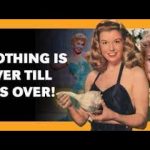In the medical action drama series Emergency, actress and songstress Julie London played RN Dixie McCall. Her character’s presence is enough to ease the troubles of her ailing patients. At the same time soothing the viewing audience’s woes as well. London played that beloved character for 126 episodes. Her career saw her play an eclectic range of roles that garners her quite a bit of acclaim as well. She also had a pretty prolific career as a singer, belting out sultry songs before making it big in Hollywood. People remember her best for her career, as she releases a total of 30 or so albums throughout her life.
During World War II, London also had a brief, albeit successful, career as a model and pin-up star. She’s a Jane of all Trades who works alongside legends like Robert Mitchum, Rock Hudson, and Gary Cooper. But what became of her after the Emergency ended? It appeared as if London suddenly fell off the face of the earth! Join FactsVerse as we take a look at why Julie London’s career all but ended after her stint on television. Some even say that it ended because she was too sexy. Keep watching to see if there is any truth to that rumor.
Julie London’s Early Years
Nancy Gail Peck is born on September 26, 1926. She is the daughter of two vaudevillian performers and developed a love for singing from an early age.
Her career launches after the encounter with Henry Waxman. A photographer who works for Esquire magazine, while she is working as a shop clerk at a menswear store. Waxmen did a photoshoot with 17-year-old London while she was draped with a soaking wet sheet. The provocative image publishes in the November 1943 issue of the magazine – and just like that, London notices.
As the case with many other young women who appears in the pages of Esquire back then. London becomes a popular pin-up girl for the troops serving in WWII.
Still, a teenager, London’s acting career launches in 1944. She appears in the film Nabonga, a movie that is popular movie King Kong, about a giant gorilla.
London Married Twice
Previously, when London was just 15, she met Jack Webb in a nightclub. She would eventually marry Webb, who was then a prominent radio personality. The two tied the knot in 1947, and London would subsequently quit her acting career to be a full-time wife and mother of Webb’s children. The couple would divorce in 1953 after having two kids.
Just six months after divorcing Webb, London met Bobby Troup, a songwriter famous for the hit song Route 66. She and Troup would marry in 1959.
London’s Singing Career
Opposite Rock Hudson, London appeared in several films, including The Fat Man, but more frequently on television shows.
But even though she was a successful actress already, she was mostly known as a singer in the 1950s and 1960s. She was well-known for her sultry voice and released somewhere in the ballpark of 30 albums. Her first album, Her Name Is Julie, featured the hit song Cry me a River, which was originally written by Arthur Hamilton for Ella Fitzgerald.
When London was offered the song, she turned it into a top 10 hit, and it became the best-known song of her career.
Billboard named London their most popular female singer for several years in a row, and she ultimately got her own star on the Hollywood Walk of Fame for her work in music.
The Julie London Dilemma
Although she was known for her sexy, alluring voice, London also had a beautiful face and gorgeous figure. She had the whole package, and producers over at Liberty wanted to make full use of her looks on her album covers.
In fact, in retrospect, London attributed much of her success as an actress to her fame as a singer. But even though she had all of the factors going for her that should have allowed her to pursue her acting career even further than she did, London eventually found it difficult to find roles that would best suit her.
It’s speculated that Julie’s sultry voice might just have been what was behind her career decline. The Associated Press summed up her career troubles amusingly in 1961 when they ran an article titled The Julie London Dilemma: She Sounds Too Sexy.
The world was far too focused on her looks – so much so that they proved to be too distracting. The liner notes of her albums even indicated as much. For example, the notes for her album Calendar Girl read that it was no wonder why her voice came out so well considering where it had been.
One Liberty exec was quoted in that AP article as saying that London was the only singer that he knew of that could sell albums to men who didn’t even own turntables.
In 1969, London released her final album, Yummy Yummy Yummy.
Enjoying this video so far? If so, take a moment to show us a little support by giving it a like and by subscribing to Facts Verse if you haven’t already.
London Was Always Her Own Harshest Critic
Singer and actress Julie London always portrayed herself as confident when performing on the stage and screen, but in truth, she was always a bit skeptical of her abilities. Even so, she was a master of her craft.
Take that previously referenced hit single Cry Me A River, for example. After Barney Kessel’s fantastic guitar lead intro, every second of that track was perfected by London’s flawless delivery. Singers will often spend their entire lives trying to achieve what London was able to accomplish in that song, seemingly effortlessly.
But despite the fact that she was applauded so heavily for her singing chops, she still criticized it heavily. She told one reporter when she was 29 that the only reason why she sang so sexy and low was because she simply couldn’t sing any higher.
Her Success Was Achieved Through A Series Of Accidents
Much of Julie’s career successes came about by sheer happenstance. Take for example that chance encounter with a photographer when she was still just a teen. If she wasn’t working as a clerk at the time, she would have never gotten noticed.
Her film roles weren’t always the best. Many of the plots of those early movies were pretty predictable and formulaic, but London still managed to shine in them. Because of her charm, she remained in a favorable light with the viewing public and stayed relevant. If she hadn’t been so memorable, she would have likely been forgotten about already by the time that Jack Webb was casting his 1970s drama series Emergency. But that’s another instance where luck suited her. Having previously been married to Webb, London already had an in that proved to be exactly what her career needed at the time to stay afloat – but we’ll touch on that in just a moment.
After her and Webb’s marriage had ended in the 50s, London turned to music as a way to cope with her tangled web of feelings. That was before she had discovered that she was gifted with a powerful singing voice, so she was merely listening to music at the time.
In 1954, London had another chance encounter that would change her life. That’s when she ran into Bobby Troup at a nightclub. If she hadn’t been there that evening, then she would have never been recognized for her talents, nor would she have met who would become her second husband.
So many pieces of London’s success story boil down to being at the right place at the right time.
Emergency! Provided London With The Revival her Career Needed
London and Jack Webb remained on good terms even after their marriage ended. This amicable post-marriage relationship led to him casting London in Emergency in 1972. The series would prove to be a huge success and ran for seven years before ending in 1979. Emergency was set in the same television universe as Webb’s other hit shows, Adam-12 and Dragnet, and in it, London played Registered Nurse Dixie McCall. To prepare for her role in that series, London studied medical terminology so that she could come off as authentic.
London Left Hollywood Behind In Her Early 50s
London stepped out of the spotlight and left show business behind after Emergency wrapped up in 1979. The last song she ever released as a singer was a cover of the song My Funny Valentine, which was included on the soundtrack of the 1981 Burt Reynolds film Sharky’s Machine.
Despite her public persona, London spent the majority of her later life outside of the limelight – withdrawn and introverted. She rarely gave interviews and refused to talk about her personal life.
In 1995, London, who had been a heavy smoker for her entire life, suffered a stroke. While she survived, her health continued to deteriorate after that until she finally died of heart failure on October 18, 2000.
London was cremated, and her ashes were buried next to Bobby Troup’s in the Courts of Remembrance Columbarium of Providence at the Forest Lawn-Hollywood Hills Cemetary in LA.
1,000 Recordings
Since her death, London’s songs have been covered by numerous recording stars. She has been cited as an influence by contemporary artists such as Lana Del Rey. Her albums Around Midnight and Julie…At Home have both been included in the book 1,000 Recordings to Hear Before You Die.
While we’re just about out of time for this video, now’s your chance to let your voice be heard. Do you remember Julie London best as a singer or as an actress? And what are some of your favorite songs, films, or television shows that featured her talents? Let us know in the comments section down below.
And before you go, make sure you take a moment to show us a little support by giving this video a like and by subscribing to the FactsVerse channel. While you’re at it, tap the bell to turn on notifications. That way, you can keep up with all of our latest and upcoming videos as soon as they are posted.
And as always, thanks for watching! We’ll see you soon with more facts-filled videos covering some of your favorite Hollywood stars, films, and television shows.


